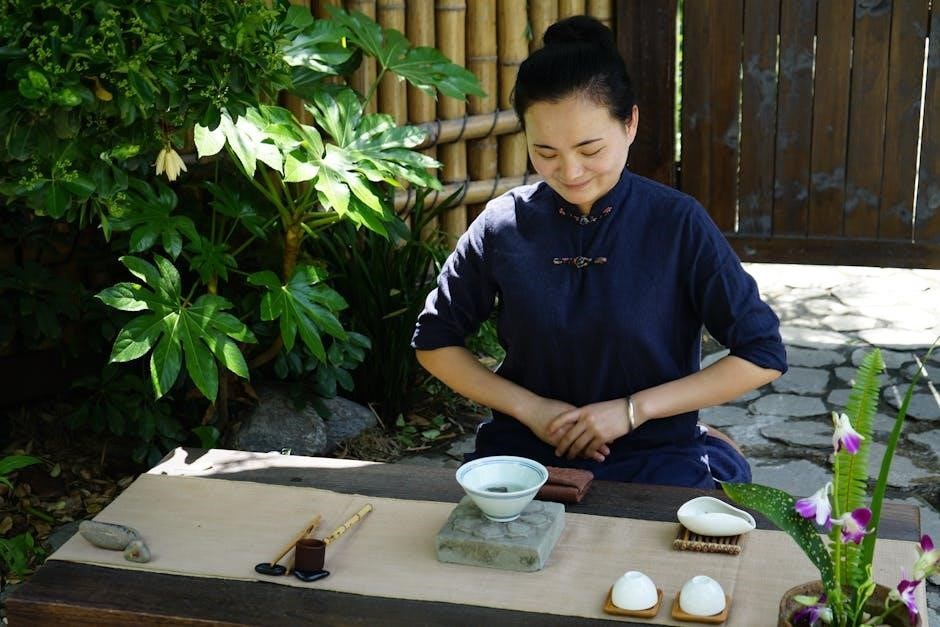
Why Practice Tests Are Essential
Practice tests familiarize you with the exam format and content, helping identify weak areas to focus on during study sessions․
Official vs․ Unofficial Tests
Official TEAS practice tests are created by ATI, offering authentic exam questions and formats, while unofficial tests are made by third parties․ Official tests provide precise content alignment and scoring, ideal for understanding exam structure․ Unofficial tests, though less standardized, offer additional practice opportunities․ Both types help improve readiness, but official tests are more reliable for assessing true exam performance․

Key Topics
The TEAS exam covers core subjects like reading, mathematics, science, and English․ Key topics include reading comprehension, algebra, data interpretation, and grammar․ Science topics focus on biology, chemistry, and anatomy․ Practice tests highlight these areas, ensuring comprehensive preparation and improved performance in all sections of the exam․

Question Types
The TEAS exam features multiple-choice questions, reading comprehension passages, algebraic problems, and data interpretation charts․ Practice tests include these formats, helping candidates familiarize themselves with the exam structure and timing․ Science and math questions often require analysis and calculation, while English sections test grammar and comprehension skills․ Understanding these question types enhances preparation and confidence for the actual test․
- Reading Comprehension: Focuses on understanding and analyzing passages, identifying main ideas, and making inferences․
- Mathematics: Includes algebra, data interpretation, and basic arithmetic to assess problem-solving skills․
- Science: Covers anatomy, physiology, and basic scientific concepts to evaluate knowledge and reasoning․
- English: Tests grammar, syntax, and vocabulary to ensure strong communication skills․
The TEAS exam features multiple-choice questions designed to assess knowledge and reasoning skills․ Common question types include:
- Reading Comprehension: Passages followed by questions to test understanding and inference abilities․
- Math Problems: Numerical questions requiring calculation and problem-solving skills․
- Science Questions: Fact-based and application questions covering biology, chemistry, and more․
Practicing these question types helps build exam familiarity and confidence․
The TEAS exam covers essential subjects like Reading, Mathematics, Science, and English․ Key topics include:
- Reading: Comprehension, vocabulary, and identifying main ideas․
- Mathematics: Algebra, geometry, and basic arithmetic skills․
- Science: Biology, chemistry, and general scientific knowledge․
- English: Grammar, sentence structure, and language usage․
Mastering these areas is critical for success on the TEAS exam․
The TEAS exam features multiple-choice questions designed to assess critical thinking and problem-solving skills․ Question types include:
- Multiple Choice: Selecting the correct answer from several options․
- Fill-in-the-Blank: Completing sentences or equations with missing information․
- Hot Spot: Identifying specific areas on images or diagrams․
- Drag and Drop: Organizing items in a particular order․
Practicing these formats ensures exam readiness and confidence․
Key topics on the TEAS exam include reading comprehension, science, mathematics, and English language skills․ These subjects are crucial for healthcare and nursing programs․ Practice questions focus on:
- Reading Comprehension: Understanding complex texts and passages․
- Science: Biology, chemistry, and anatomy basics․
- Mathematics: Algebra, geometry, and data interpretation․
- English: Grammar, punctuation, and vocabulary․
Mastering these areas ensures a strong foundation for success․
The TEAS exam features multiple-choice questions designed to assess critical thinking and knowledge․ Common question types include:
- Reading Comprehension: Passages followed by interpretive questions․
- Mathematical Calculations: Algebra, geometry, and data analysis problems․
- Science Applications: Questions on biology, chemistry, and anatomy․
- English Grammar: Tests on punctuation, syntax, and vocabulary․
These question types ensure a comprehensive evaluation of essential skills․
Official Sources
ATI TEAS official practice tests are the most reliable source for exam preparation․ The official 150-question practice test mirrors the actual exam format and content, ensuring authenticity․ Additionally, ATI offers free 60-question practice tests online, providing valuable insights into performance and identifying areas needing improvement․ These resources are essential for a realistic exam experience․
Unofficial Sources
Unofficial sources like Quizlet, Mometrix, and YouTube offer TEAS practice questions and study guides․ These resources provide additional practice materials, including PDFs, to supplement official tests․ While not aligned with ATI, they offer a variety of questions and study tips, helping candidates prepare thoroughly for the exam․ However, always verify the quality and accuracy of unofficial materials․

Study Tips
Utilize TEAS practice questions in PDF format to create an effective study schedule․ Focus on understanding each topic thoroughly rather than just answering questions․ Take timed practice tests to simulate exam conditions and improve time management․ Review mistakes to identify weak areas and track your progress․ Organize study materials and prioritize challenging subjects to ensure comprehensive preparation for the exam․
Time Management
Mastering time management is crucial for success on the TEAS exam․ Practice tests help you allocate time effectively to each question type․ Allocate specific minutes per question and avoid spending too long on one problem; Use a timer during practice sessions to simulate exam conditions and enhance speed․ Reviewing timed practice tests reveals areas needing more efficient strategies, ensuring optimal performance during the actual test․
Why Practice?
Practicing with TEAS questions improves understanding of the exam structure and content․ It helps identify knowledge gaps, allowing focused study on challenging topics․ Regular practice builds confidence and reduces test anxiety․ By simulating exam conditions, practice tests enhance time management and question-solving skills, leading to better overall performance and higher scores on the actual TEAS exam․
Official Tests
Official TEAS practice tests are designed to mirror the actual exam, offering a realistic experience․ They include questions aligned with the exam content and format, ensuring accurate preparation․ These tests are endorsed by ATI, the creator of the TEAS exam, and provide reliable score assessments to identify areas needing improvement․ Regular use enhances familiarity with the exam structure and boosts confidence․
Topics
Key topics on the TEAS exam include Reading, Mathematics, Science, and English and Language Usage․ Practice questions cover essential skills like comprehension, algebra, anatomy, and grammar․ The Reading section tests critical thinking, while Mathematics focuses on data interpretation and problem-solving; Science questions emphasize biology and chemistry, and English assesses language mechanics and vocabulary․ These topics are crucial for healthcare career readiness;
TEAS practice questions cover Reading, Mathematics, Science, and English․ The Reading section focuses on comprehension and critical thinking․ Mathematics includes algebra, ratios, and data analysis․ Science emphasizes biology, chemistry, and anatomy․ English tests grammar, syntax, and vocabulary․ These topics are designed to assess foundational skills for healthcare education, ensuring readiness for the demands of nursing and allied health programs․
TEAS practice questions cover essential subjects like Reading, Mathematics, Science, and English․ Reading focuses on comprehension and analysis․ Mathematics includes algebra and data interpretation․ Science covers biology, chemistry, and physics․ English tests grammar, punctuation, and vocabulary․ These topics are designed to evaluate critical thinking and foundational knowledge, mirroring the actual exam to ensure comprehensive preparation for nursing and healthcare programs․
The TEAS exam covers four main subjects: Reading, Mathematics, Science, and English․ Each topic is divided into subcategories, such as comprehension, algebra, biology, and grammar․ Practice questions help candidates master these areas, ensuring they are well-prepared for the test format and content․ Focusing on these topics improves overall performance and builds confidence for the actual exam․

Sources
Official TEAS practice questions are available through ATI, the exam provider․ Unofficial sources like Mometrix and Kaplan offer additional study materials․ Free online resources, such as PDF guides, provide sample questions and study tips․ These sources help candidates prepare effectively for the exam by offering realistic practice opportunities and in-depth review materials․
Utilize TEAS practice questions to understand the exam format and identify weak areas․ Allocate time for each section to improve speed and accuracy․ Review answer explanations to learn from mistakes․ Focus on high-weight topics like reading comprehension and math fundamentals․ Incorporate active learning techniques, such as flashcards, to reinforce concepts․ Consistent practice ensures readiness and boosts confidence for test day․
Practicing with TEAS questions helps build familiarity with the exam format, identifies knowledge gaps, and enhances problem-solving skills․ Regular practice improves time management and reduces test anxiety, ensuring better performance․ It allows candidates to refine their strategies and gain confidence, which is crucial for achieving a high score on the actual TEAS exam․
Official TEAS practice tests are designed to mirror the actual exam, offering authentic questions and formats․ They provide detailed scoring and insights, helping candidates identify areas for improvement․ These tests are the only ones officially aligned with the ATI TEAS exam, ensuring a realistic preparation experience․ Regular use enhances familiarity and boosts confidence for the real test day․
TEAS practice questions cover essential subjects like Reading, Mathematics, Science, and English․ These topics are crucial for healthcare professionals, ensuring a strong foundation in comprehension, algebra, biology, and grammar․ Practice tests focus on these areas, helping candidates master the skills needed for the exam and their future careers in nursing and allied health fields․
Tips
Utilize TEAS practice questions to simulate exam conditions, improving time management and test-taking strategies․ Regularly review mistakes to enhance understanding and retention․ Focus on weak areas identified through practice tests to optimize study efficiency and build confidence for the actual exam․ Consistent practice ensures readiness and reduces anxiety on test day․
Key areas covered in TEAS practice questions include reading comprehension, mathematics, science, and English language skills․ These topics align with the actual exam, ensuring comprehensive preparation․ Practice tests also emphasize critical thinking and problem-solving, mirroring real exam challenges․ Focusing on these areas helps build a strong foundation for success on the TEAS exam․
Utilize official TEAS practice tests to simulate exam conditions, improving time management and familiarizing yourself with the format․ Review detailed explanations to understand mistakes and strengthen weak areas․ Regular practice helps build confidence and reduces test anxiety, ensuring peak performance on exam day․ Consistent study with relevant materials is key to achieving higher scores․ Stay focused and organized to maximize your preparation;
Key topics include Reading Comprehension, Science, and Mathematics, with a focus on critical thinking and problem-solving skills․ Practice tests cover areas like human anatomy, algebra, and literary analysis, ensuring comprehensive preparation․ Regular review of these subjects helps build a strong foundation, essential for success on the TEAS exam․ Stay updated on the latest content to excel in your studies․
Utilize official TEAS practice tests to simulate exam conditions․ Set timers to improve time management․ Focus on weak areas identified through practice․ Review answer explanations for better understanding․ Engage in active learning by taking notes and revisiting challenging topics․ Consistent practice ensures familiarity with question formats and boosts confidence for the actual exam․ Stay disciplined and maintain a study routine․
Key areas covered in TEAS practice questions include reading comprehension, math fundamentals, and science concepts․ English grammar and vocabulary are also essential․ Practice tests emphasize critical thinking and problem-solving skills․ Familiarity with these topics ensures readiness for the exam․ Regular review of these subjects helps build a strong foundation and improves overall performance in the TEAS exam․
Utilize practice questions to simulate exam conditions and manage time effectively․ Focus on understanding weak areas and reviewing mistakes․ Prioritize topics where improvement is needed․ Regular practice builds confidence and enhances problem-solving skills․ Using official resources ensures alignment with exam content․ Consistent study helps achieve a higher score and prepares you thoroughly for the TEAS exam․
Official ATI TEAS practice tests are the most reliable source, offering authentic questions and formats․ Free online platforms provide sample questions for initial preparation․ Paid resources, such as TEAS practice workbooks and online assessments, offer comprehensive study materials․ Utilizing these sources ensures a well-rounded preparation for the exam, covering all necessary topics and question types effectively․
Regularly taking TEAS practice tests helps identify strengths and weaknesses․ Focus on understanding concepts rather than memorizing answers․ Allocate dedicated time for each subject, prioritizing areas needing improvement․ Review explanations for incorrect answers to avoid repeat mistakes․ Consistent practice and structured study routines significantly enhance exam readiness and confidence․
Practice tests simulate the actual exam environment, reducing anxiety and building familiarity․ They help identify weak areas, allowing focused study․ Regular practice improves performance, enhances time management, and boosts confidence․ Consistent practice with TEAS questions ensures better preparation and higher scores․
Official vs Unofficial
Official TEAS practice tests are created by ATI, ensuring authenticity and alignment with the actual exam․ They offer accurate scoring and content․ Unofficial tests, while helpful, may lack the precise format and quality․ Using official sources guarantees a realistic experience, aiding better preparation and performance․
Key topics on the TEAS exam include Reading, Science, and Mathematics․ Reading focuses on comprehension and vocabulary․ Science covers anatomy, biology, and chemistry․ Mathematics includes algebra, data interpretation, and basic arithmetic․ English grammar and vocabulary are also tested․ These topics are essential for healthcare-related fields and are consistently emphasized in practice questions to ensure thorough preparation․
Key topics in TEAS practice questions include English grammar, vocabulary, and scientific concepts․ Science topics cover anatomy, biology, and chemistry․ Mathematics focuses on algebra, data interpretation, and basic arithmetic․ These areas are crucial for healthcare-related fields․ Practice questions emphasize these topics to help students assess their knowledge and identify areas needing improvement, ensuring comprehensive preparation for the exam․
Key topics in TEAS practice questions include Reading, Science, and Mathematics․ Reading focuses on comprehension, vocabulary, and grammar․ Science covers biology, chemistry, anatomy, and physics․ Mathematics includes algebra, arithmetic, and data interpretation․ These topics are essential for assessing knowledge and skills relevant to healthcare education, ensuring thorough preparation for the exam through targeted practice․
Key topics in TEAS practice questions include Reading, Mathematics, and Science; Reading focuses on comprehension, vocabulary, and identifying main ideas․ Mathematics covers algebra, geometry, and basic arithmetic․ Science includes biology, chemistry, and physics concepts․ These topics are designed to assess critical thinking and problem-solving skills, mirroring the actual exam structure to ensure comprehensive preparation for healthcare education entrance exams․
Official sources include ATI TEAS practice tests, which offer realistic exam simulations․ Unofficial sources, like online platforms and educational websites, provide additional practice materials․ Both options help students gauge their readiness and identify areas needing improvement, ensuring a well-rounded study approach for the TEAS exam․




